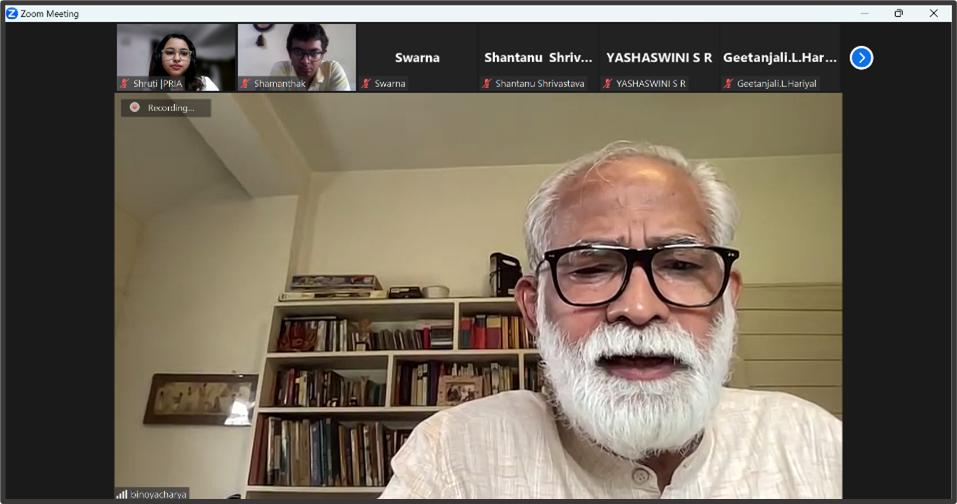
Delivering Inclusive Services: How can citizens, organisations, and governments (across all levels) ensure that the voices of the poor are being heard
In continuation of last week’s session where we learnt about the ways and means in which citizens and civil society organisations can hold the government accountable, this week we delved into the challenges that institutions and government face in the delivery of services to the marginalised individuals and explored ways to rectify these challenges.
For over four decades, PRIA has advocated for Participation. The organisation has a longstanding commitment to promoting participation as a tool for transforming power and amplifying the voices of marginalized groups- be it strengthening the voices of forest dwellers and rural women, holding school of participation, including voices of women and Dalits in Panchayati Raj institutions, or advocating for rights of migrant workers, Participation has been at the heart of our work.
The government has the power and authority to get things done. But what can citizens do when the government fails to fulfill its responsibilities? In a democratic country like India, citizens have the power to hold the government accountable.
Research is a vital component of the Youth for Governance Fellowship (Y4G) program. In order to empower young individuals to tackle urban issues of their city, Y4G fellows are mandated to engage in a community-based participatory research (CBPR) study focusing on topics of Social Accountability and Participatory Governance.
In the final session of the Self module, titled "Diversity of Self," Ms. Nikita Rakhyani, Lead-Youth Engagement at PRIA (Participatory Research In Asia), conducted a session centered around Goffman's theory of Self. The aim was to help fellows explore the different facets of themselves when they interact with different people.
Do you know who you are, or have you based your entire personality on what others tell you about yourself? Have you ever wondered what is the difference between gender, sexuality, and sexual identity?
Citizen participation is a fundamental aspect of any democratic process. When citizens unite to hold the government accountable and ensure their voices are heard, significant changes can take place.
How does our mind function? Are the mind and the brain the same or different? Is the mind part of ourselves? How do we take care of our mind? We all have thoughts, but what exactly are thoughts? What are the emotions that we so often experience? Why do we feel anxious? These are some questions we often think about but don't necessarily receive answers to.
The session on Physical Self, as part of the Self Module, was conducted on May 28 by Ms. Isha Saxena (Project Officer) and Mr. Akash Thapa (Training and Monitoring Officer) from Pro Sport Development (PSD). PSD is a sport for development organisation that works with youth and children, using sport as a tool for their holistic development.
The first virtual session, with the second cohort of the Youth for Governance took place on the 21st of May. The session on Democracy in Everyday Life and was facilitated by Dr. Rajesh Tandon, Founder-President of PRIA and Ms. Shruti Priya, Program officer at PRIA.
Continuing our endeavour towards promoting understanding among youth in Karnataka on the values of federalism, principles and structures of decentralised governance of the country along with confidence in Self and their ability to promote common good and contribute to participatory governance- the Youth for Governance Fellowship, Mysuru edition is back for a second term.
This week’s session was facilitated by Dr. Kaustuv Kanti Bandyopadhyay. It focused on learning about the community scorecard (CSC) – a participatory tool for monitoring and assessment of services. CSC brings together the demand side (“service user”) and the supply side (“service provider”) of a particular service or program to jointly analyze issues underlying service delivery problems and then find a common and shared way of addressing those issues.
This week's session titled, ‘Relations between Government and Citizens’ was the first session facilitated as part of the Social Accountability module. The session aimed to inform fellows about the types and benefits of social accountability, and rights associated with social accountability. It was facilitated by Dr. Kaustuv Kanti Bandyopadhyay, Director at PRIA, Head of PRIA International Academy (PIA) – the academic vertical of PRIA, and leading expert on citizen participation and social accountability in the urban space.
This was the second session conducted as part of the social accountability module. It was facilitated by Mr. Binoy Acharya, Founder and Director of UNNATI – Organisation for Development Education. Mr. Acharya has been working as a researcher and public educator to promote social inclusion and democratic local governance.